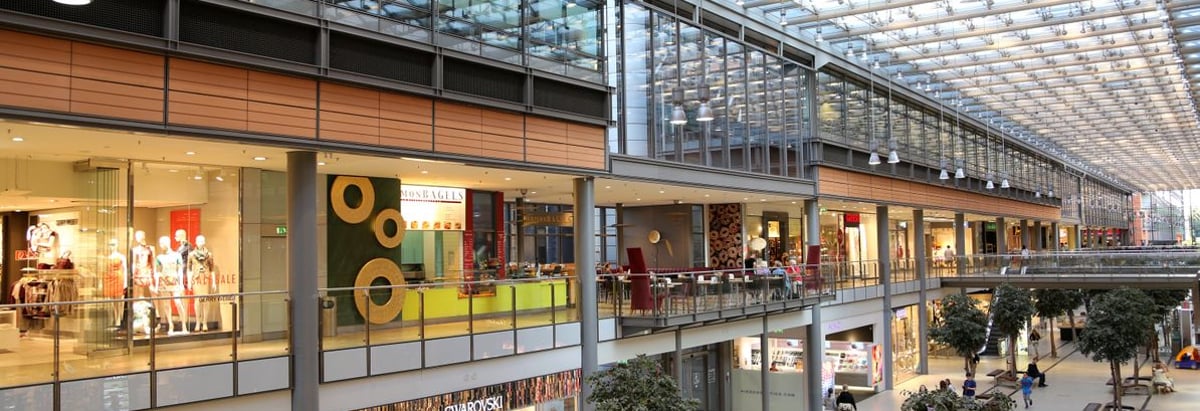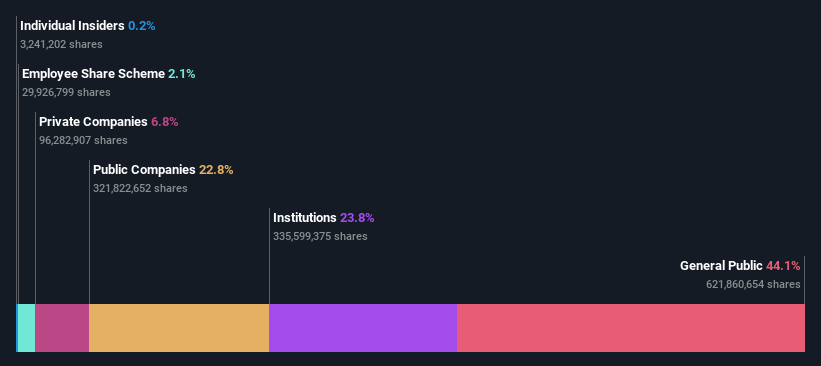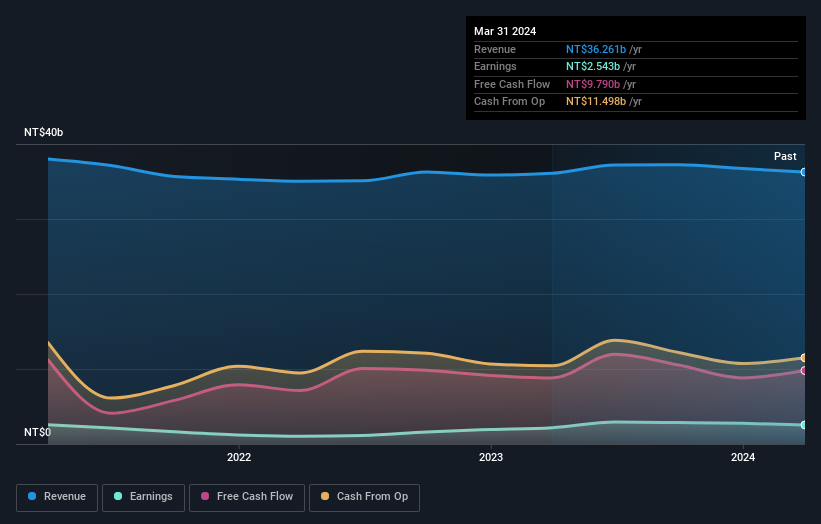Stock Analysis
Institutions profited after Far Eastern Department Stores, Ltd.'s (TWSE:2903) market cap rose NT$3.4b last week but retail investors profited the most

Key Insights
- Significant control over Far Eastern Department Stores by retail investors implies that the general public has more power to influence management and governance-related decisions
- 51% of the business is held by the top 12 shareholders
- Institutions own 24% of Far Eastern Department Stores
If you want to know who really controls Far Eastern Department Stores, Ltd. (TWSE:2903), then you'll have to look at the makeup of its share registry. And the group that holds the biggest piece of the pie are retail investors with 44% ownership. That is, the group stands to benefit the most if the stock rises (or lose the most if there is a downturn).
Following a 7.4% increase in the stock price last week, retail investors profited the most, but institutions who own 24% stock also stood to gain from the increase.
In the chart below, we zoom in on the different ownership groups of Far Eastern Department Stores.
See our latest analysis for Far Eastern Department Stores

What Does The Institutional Ownership Tell Us About Far Eastern Department Stores?
Institutional investors commonly compare their own returns to the returns of a commonly followed index. So they generally do consider buying larger companies that are included in the relevant benchmark index.
As you can see, institutional investors have a fair amount of stake in Far Eastern Department Stores. This suggests some credibility amongst professional investors. But we can't rely on that fact alone since institutions make bad investments sometimes, just like everyone does. If multiple institutions change their view on a stock at the same time, you could see the share price drop fast. It's therefore worth looking at Far Eastern Department Stores' earnings history below. Of course, the future is what really matters.

We note that hedge funds don't have a meaningful investment in Far Eastern Department Stores. Far Eastern New Century Corporation is currently the company's largest shareholder with 17% of shares outstanding. Asia Cement Corporation is the second largest shareholder owning 5.7% of common stock, and Yuan Ze University, Endowment Arm holds about 4.8% of the company stock.
A closer look at our ownership figures suggests that the top 12 shareholders have a combined ownership of 51% implying that no single shareholder has a majority.
While it makes sense to study institutional ownership data for a company, it also makes sense to study analyst sentiments to know which way the wind is blowing. Our information suggests that there isn't any analyst coverage of the stock, so it is probably little known.
Insider Ownership Of Far Eastern Department Stores
While the precise definition of an insider can be subjective, almost everyone considers board members to be insiders. Management ultimately answers to the board. However, it is not uncommon for managers to be executive board members, especially if they are a founder or the CEO.
Most consider insider ownership a positive because it can indicate the board is well aligned with other shareholders. However, on some occasions too much power is concentrated within this group.
Our data suggests that insiders own under 1% of Far Eastern Department Stores, Ltd. in their own names. But they may have an indirect interest through a corporate structure that we haven't picked up on. It's a big company, so even a small proportional interest can create alignment between the board and shareholders. In this case insiders own NT$113m worth of shares. It is good to see board members owning shares, but it might be worth checking if those insiders have been buying.
General Public Ownership
The general public-- including retail investors -- own 44% stake in the company, and hence can't easily be ignored. This size of ownership, while considerable, may not be enough to change company policy if the decision is not in sync with other large shareholders.
Private Company Ownership
It seems that Private Companies own 6.8%, of the Far Eastern Department Stores stock. It might be worth looking deeper into this. If related parties, such as insiders, have an interest in one of these private companies, that should be disclosed in the annual report. Private companies may also have a strategic interest in the company.
Public Company Ownership
Public companies currently own 23% of Far Eastern Department Stores stock. It's hard to say for sure but this suggests they have entwined business interests. This might be a strategic stake, so it's worth watching this space for changes in ownership.
Next Steps:
I find it very interesting to look at who exactly owns a company. But to truly gain insight, we need to consider other information, too. Take risks for example - Far Eastern Department Stores has 1 warning sign we think you should be aware of.
If you would prefer check out another company -- one with potentially superior financials -- then do not miss this free list of interesting companies, backed by strong financial data.
NB: Figures in this article are calculated using data from the last twelve months, which refer to the 12-month period ending on the last date of the month the financial statement is dated. This may not be consistent with full year annual report figures.
Valuation is complex, but we're helping make it simple.
Find out whether Far Eastern Department Stores is potentially over or undervalued by checking out our comprehensive analysis, which includes fair value estimates, risks and warnings, dividends, insider transactions and financial health.
View the Free AnalysisHave feedback on this article? Concerned about the content? Get in touch with us directly. Alternatively, email editorial-team (at) simplywallst.com.
This article by Simply Wall St is general in nature. We provide commentary based on historical data and analyst forecasts only using an unbiased methodology and our articles are not intended to be financial advice. It does not constitute a recommendation to buy or sell any stock, and does not take account of your objectives, or your financial situation. We aim to bring you long-term focused analysis driven by fundamental data. Note that our analysis may not factor in the latest price-sensitive company announcements or qualitative material. Simply Wall St has no position in any stocks mentioned.
Valuation is complex, but we're helping make it simple.
Find out whether Far Eastern Department Stores is potentially over or undervalued by checking out our comprehensive analysis, which includes fair value estimates, risks and warnings, dividends, insider transactions and financial health.
View the Free AnalysisHave feedback on this article? Concerned about the content? Get in touch with us directly. Alternatively, email editorial-team@simplywallst.com
About TWSE:2903
Far Eastern Department Stores
Operates department stores and supermarkets in Taiwan.
Established dividend payer and good value.

